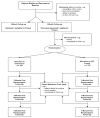Treating persistent depressive symptoms in post-ACS patients: the project COPES phase-I randomized controlled trial
- PMID: 17904917
- PMCID: PMC2315791
- DOI: 10.1016/j.cct.2007.08.003
Treating persistent depressive symptoms in post-ACS patients: the project COPES phase-I randomized controlled trial
Abstract
Depression and sub-syndromal depressive symptoms are important predictors of morbidity and mortality after acute coronary syndrome (ACS). Prior trials of depression treatment in post-ACS patients have demonstrated no improvement for event-free survival, and only modest improvement in depression symptoms. These trials have raised a number of important issues regarding timing of depression intervention, acceptability of depression treatment to ACS patients, and safety for subsets of the treated population. This article describes Project COPES (Coronary Psychosocial Evaluation Studies), a multi-center Phase-I randomized clinical trial. Project COPES uses a patient preference depression treatment that has previously been found acceptable to medical patients, and a 3-month pre-randomization observation period to insure depression status. The study sample will include 200 post-ACS patients. The primary outcome is patient satisfaction with depression care. Secondary, exploratory aims include the acceptability of depression treatment, reduction in depressive symptoms, and the effects of treatment on two key pathways--medication adherence and inflammation--hypothesized to link depression to post-ACS prognosis. These analyses will provide important data to inform subsequent clinical trials with this population.
References
-
- Barth J, Schumacher M, Herrmann-Lingen C. Depression as a risk factor for mortality in patients with coronary heart disease: a meta-analysis. Psychosom Med. 2004;66:802–13. - PubMed
-
- Frasure-Smith N. The Montreal Heart Attack Readjustment Trial. J Cardiopulm Rehabil. 1995;15:103–6. - PubMed
-
- Berkman LF, Blumenthal J, Burg M, Carney RM, Catellier D, Cowan MJ, Czajkowski SM, DeBusk R, Hosking J, Jaffe A, Kaufmann PG, Mitchell P, Norman J, Powell LH, Raczynski JM, Schneiderman N ENRICHD Investigators. The enhancing recovery in coronary heart disease patients (ENRICHD) study: The effects of treating depression and low social support on clinical events after myocardial infarction. JAMA. 2003;289:3106–16. - PubMed
-
- Friedman M, Thoresen CE, Gill J, Ulmer D, Powell LH, Price VA, Brown B, Thompson L, Rabin DD, Breall WS, Bourg W, Levy R, Dixon T. Alteration of type A behavior and its effect on cardiac recurrences in post-myocardial infarction patients: summary results of the recurrent coronary prevention project. Am Heart J. 1986;112:653–65. - PubMed
-
- Blumenthal JA, Jiang W, Babyak MA, Krantz DS, Frid DJ, Coleman RE, Waugh R, Hanson M, Appelbaum M, O’Connor C, Morris JJ. Stress management and exercise training in cardiac patients with myocardial ischemia. Effects on prognosis and evaluation of mechanisms. Arch Intern Med. 1997;157:2213–23. - PubMed
Publication types
MeSH terms
Grants and funding
LinkOut - more resources
Full Text Sources
Medical


